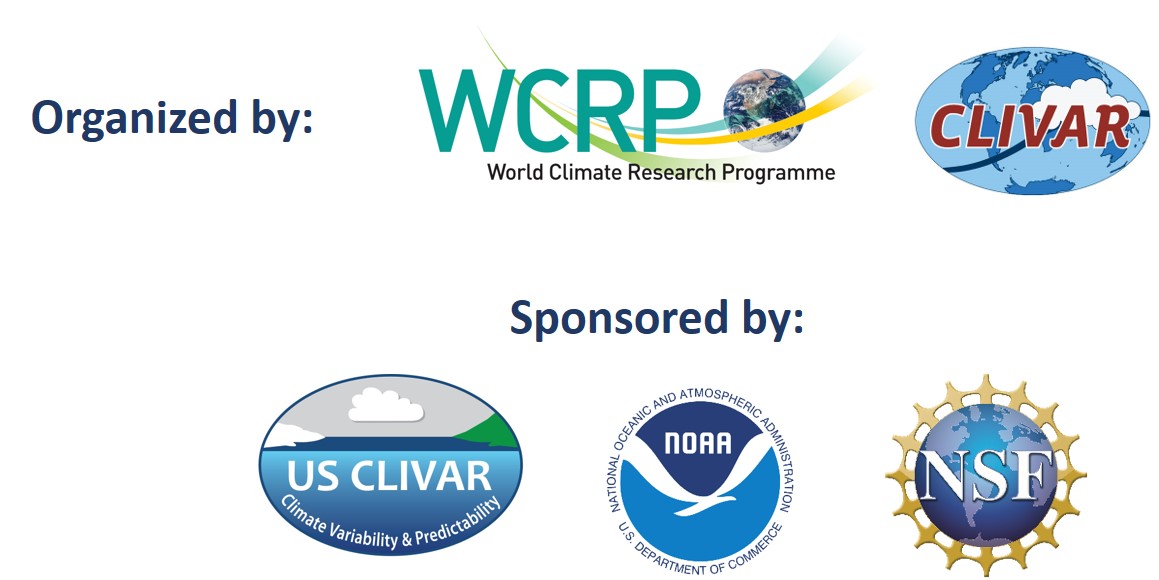WCRP-CLIVAR Workshop on Climate Interactions among the Tropical Basins (Online)

February 24-25. 2021 (Open). February 26: (By invitation only)
*The registration system is closed.
We invite researchers to submit their work to be presented during this event. All submitted abstracts will be poster presentations. Early Career Scientist are specially encouraged to submit.
This workshop is free of charge but registration is required.
- Scientific Organizing Committee
- Aims and objectives
- Meeting format
- Agenda
- Further Information
- Know Before You Go
- Download abstracts and recordings
- View the Posters
- Ingo Richter (Co-chair, JAMSTEC, Japan)
- Noel Keenlyside (Co-chair, Bjerknes Centre for Climate Research, Norway)
- Michael McPhaden (NOAA/PMEL, USA)
- Yuko Okumura (University of Texas at Austin, USA)
- Chunzai Wang (South China Sea Institute of Oceanology, China)
- Ping Chang (Texas A&M University, USA)
- Malte Stuecker (University of Hawaii, USA)
- Andrea Taschetto (University of New South Wales, Australia)
The interactions among the tropical Pacific, Atlantic, and Indian Ocean basins are increasingly recognized as a key factor in understanding climate variability on interannual to decadal timescales. While recent years have seen progress toward understanding tropical basin interactions, much remains to be learned. This includes a deeper understanding of the mechanisms, the preferred pathways, and the potential benefits for seasonal-to-decadal prediction. In order to make progress in these areas the CLIVAR Research Focus on Tropical Basin Interaction (TBI) is organizing a workshop that will bring together scientists with a broad range of expertise. The objectives of this workshop are as follows:
- Provide an overview of the current scientific understanding of TBI.
- Identify knowledge gaps and shortcoming of current modeling approaches, as well as new observations, including paleo-proxies, that would contribute to a better understanding of TBI.
- Develop an experimental protocol for coordinated model sensitivity tests to advance the understanding of TBI and, in particular, its potential role in seasonal-to-decadal prediction. This will form the basis for a set of coordinated GCM experiments. The RF TBI will solicit the participation of modeling centers and research groups in these experiments.
- Discuss novel approaches for studying interaction among the tropical basins, including conceptual models, machine learning, and proxy data.
The workshop will be held over a 3-day period and feature three formats:
1) Plenary talks reviewing the current understanding of TBI
There will be eight 30-minute invited talks focusing on various aspects of TBI, such as time scales (e.g. subseasonal-to-interannual vs. decadal) and techniques (e.g. GCM experiments vs. conceptual models).
2) Poster sessions focusing on new research results and approaches
The workshop will welcome TBI studies using observations, paleo reconstructions, theory, and modeling approaches of any complexity (from toy models to global climate models). Areas of particular interest include:
- atmospheric and oceanic pathways of inter-basin interactions, as well as their mechanisms
- the benefit of TBI for seasonal-to-decadal prediction
- the influence of model biases on the simulation of TBI
- projected changes of TBI
- TBI in proxy data
3) Plenary discussions and breakout groups to discuss the best ways forward (By invitation only)
A particular focus of the discussions will be on designing GCM sensitivity tests that can help to deepen our understanding of TBI and quantify its impacts on interannual prediction skill. Attention will also be paid on how a hierarchy of models of varying complexity, from toy models to full-fledged Earth System Models, can help to understand and quantify TBI. We are also interested in discussion of what light paleo-proxy archives can shine on TBI.
Programme at a glance
|
Date Time (UTC) |
24 February (Wednesday) Current understanding of interbasin linkage |
25 February (Thursday) Approaches for understanding interbasin linkage |
26 February (Friday) Working Groups discussions |
|---|---|---|---|
|
14:00-16:00 |
Subseasonal-to-interannual time scales (Plenary talk 1) |
Statistical methods (Plenary talk 5) |
Time Slot 1. WG1: GCM experiments |
|
Past Climates (Plenary talk 2) |
GCM experiments (Plenary talk 6) |
||
|
Poster session 1 |
Poster session 3 |
||
|
16:00-21:00 |
Break |
Break |
Break |
|
21:00-23:00 |
Decadal time scales (Plenary talk 3) |
Conceptual models and theory (Plenary talk 7) |
Time Slot 2. WG1: GCM experiments |
|
Climate change (Plenary talk 4) |
Paleo proxies (Plenary talk 8) |
||
|
Poster session 2 |
Poster session 4 |
||
|
23:00-24:00 |
Breakout discussion |
Breakout discussion |
|
|
24:00 – (0:00+1d) |
Plenary Session |
Plenary Session |
Go to the detailed agenda
1) Each day will have three sessions at 09-11 GMT, 15-17 GMT, and 23-24 GMT. The sessions are deliberately separated by several hours to ensure that, for each time zone, at least one slot is convenient. This is an important consideration for a virtual meeting with attendees located across a wide range of time zones.
2) Poster sessions will have a core time but additional viewing times can be freely scheduled by the presenters.
3) All sessions will be recorded and be made available for viewing to participants. Pending approval by all participants, recordings will also be made available to the general public.











Add new comment